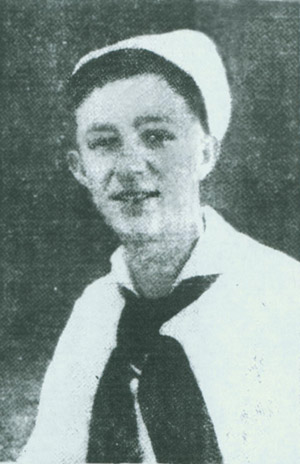

Remember...
Randall James Thomas
1921-1941
"A hero is someone who has given his or her life to something bigger than oneself."
Joseph Campbell
 |
Remember...Randall James Thomas
|
Randall James Thomas was born at Erbacon in Webster County, West Virginia, on March 3, 1921. He was born to a large family, the locally well-known William Auburn Thomas and Ella Davis Thomas, who would end up in Cowen, where Randall completed his education. His siblings included sisters Lutelia, Edna, Iva, and Evelyn and brothers Murill and Lincoln. Webster County, both now and then, was sparsely populated, and in the town of Cowen, one gets the impression that everyone knows everyone. His Cowen upbringing would've shaped the man Randall grew into. Erbacon, like most in West Virginia, was a company coal-mining town; timber and coal dominated the county's economy. Randall would've grown up in an environment where blue collar workers made up the majority of the population.
At the age of 19, on the 10th of November 1939, Randall enlisted as a member of United States Navy. At this time in history, the United States was uncommitted (both on the national political level and on the smaller community level) to a formal entry in the developing European war. Though, of course, we cannot know the specifics of Randall's decision making process, one has to note that at the time World War II wasn't seen as an American conflict:it was a European conflict on the horizon for the country to stay out of. The cultural context, taken along with his small town background, certainly informs our understanding. He was a clerk before he joined the service, and in the midst of a high school education. One account describes him as a "happy good natured boy [who] was loved by the faculty and student body."
After he went through training, Randall's career found its way through a few small Navy outposts, as evidenced in his muster rolls, before landing where American entrance to World War II was facilitated. Randall was transferred to Pearl Harbor, initially on the USS West Virginia. His tenure there began on December 10, 1940, where one assumes he felt a degree of pride at serving on a ship named after his home state. He was a seaman.
Letters from Randall paint the picture of someone who loves his job. He claimed that he wanted other boys from his hometown of Cowen to enjoy the naval life. "I am exactly where I want to be"; Thomas's words are clear. (Webster Republican, 1 April 1942.) At some point, perhaps as recently as September 20, 1941, he was fatefully transferred from the West Virginia to the USS Arizona.
President Franklin Delano Roosevelt declared that Pearl Harbor was "a date which will live in infamy" in the speech that led to a Congressional declaration of war, and he was giving words to a sentiment that has persisted in the American conscience since. On December 7, 1941, the Imperial Japanese military machine targeted the Pearl Harbor outpost. The attack, taking place while America was still in a position of determining where the country stood in relation to the developing conflict, was a complete surprise to many of the men stationed there. An extensive bombing and naval attack occurred. More then 2,000 servicemen died, along with extensive damage to the naval and aerial installations. The attack has stood as a symbol of military victimization since its enactment, and led nearly single handedly to the American entry into the war as a definitive military partner.
Randall's death was mourned both by his surviving siblings and his mother, who by then was widowed. Further, he was mourned by his community and referenced by name by several Cowen and Webster County newspapers. So well-liked was Randall that G. Esley Arthur, principal of his high school, wrote a poem honoring the young seaman:
One day at morn, when the tide was low,
He slipped his mooring and sailed away,
With no response or a friendly hail
Of kindred crafts on a busy day.
Through the purple shadows of that darkly trail
O'er the ebbing tide of an unknown sea,
He fared [faded?] away with the dip of a sail
Of a lonely voyager passing away
To Mystic Isles where at anchor lay
The crafts of those who'd sailed before
O'er the unknown sea to the unknown shore.
The few that watched him sail away
Will miss his craft from the busy bay
Some friendly barques that were anchored near
Some loving souls that his heart held dear,
In silent sorrow will shed a tear.
But he has peacefully furled his sail
In mooring sheltered from storms and gale
And is greeting his friends who have sailed before
O'er the unknown sea to the unknown shore. ("A Tribute to Randall James Thomas," The Webster Republican, 1 April 1942.)
Although his body was not recovered, his mother needed a place to remember her son and find solace. She did so at the cemetery at Cowen, where she placed a gravestone in his honor. Each year she could be found among those Cowen citizens who trooped to the cemetery to remember their deceased loved ones, which now included Randall James Thomas.
Article prepared by Jeffrey Vandall, George Washington High School Advanced Placement U.S. History
2017

West Virginia Archives and History welcomes any additional information that can be provided about these veterans, including photographs, family names, letters and other relevant personal history.